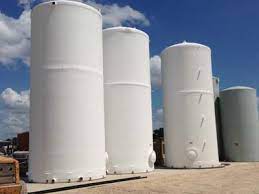Sep. 04, 2023
Machinery
Fiberglass water tanks have become a popular choice for storing and distributing water in various applications, from residential to industrial settings. These tanks are renowned for their durability and versatility. However, determining the exact life expectancy of a fiberglass water tank is not a straightforward task, as several factors influence its longevity. In this essay, we will explore the key factors affecting the lifespan of fiberglass water tanks and provide insights into how to maximize their durability.

Fiberglass water tanks are constructed using a composite material consisting of fine glass fibers embedded in a polymer resin matrix. This combination results in a tank that is lightweight, corrosion-resistant, and remarkably strong. Fiberglass tanks are particularly known for their resistance to rust and degradation, which is a common concern with metal tanks.
Quality of Manufacturing:
The quality of the manufacturing process significantly impacts the lifespan of a fiberglass water tank. Tanks produced using high-quality materials and precise manufacturing techniques are more likely to have a longer service life. Manufacturers with a reputation for excellence in fiberglass tank production are often the preferred choice.
UV Exposure:
Ultraviolet (UV) radiation from sunlight can degrade the resin in fiberglass tanks over time. To mitigate this, many fiberglass tanks are coated with a UV-resistant gel or finish. However, the degree of UV exposure and the effectiveness of the UV-resistant coating can vary depending on the tank's location and use.
Chemical Compatibility:
The type of water or liquid stored in the tank can affect its lifespan. Some chemicals or liquids may be corrosive to the resin matrix of the fiberglass. It is crucial to choose a tank that is compatible with the specific contents it will hold to prevent premature degradation.
Installation and Maintenance:
Proper installation and regular maintenance are key to maximizing the lifespan of a fiberglass water tank. Tanks should be installed on stable foundations and properly supported to prevent stress on the tank walls. Routine inspections, cleaning, and repairs, if necessary, help identify and address issues early, prolonging the tank's life.
Temperature Fluctuations:
Extreme temperature fluctuations can affect the expansion and contraction of the tank material, potentially leading to stress fractures over time. Insulating the tank or placing it in a controlled environment can help mitigate temperature-related stresses.
While it is challenging to provide an exact figure for the life expectancy of a fiberglass water tank due to the variability of factors mentioned above, many manufacturers offer warranties that can provide some guidance. Typically, a well-maintained fiberglass tank can last anywhere from 20 to 30 years or more.
To ensure your fiberglass water tank reaches its full potential lifespan, consider the following tips:
Choose Wisely:
Select a reputable manufacturer known for producing high-quality fiberglass tanks designed for your specific application.
Proper Installation:
Ensure the tank is correctly installed on a stable foundation and supported as recommended by the manufacturer.
Regular Maintenance:
Implement a maintenance schedule that includes inspections, cleaning, and any necessary repairs.
Monitor Chemical Compatibility:
Be vigilant about the compatibility of the tank's contents with the tank material, especially if you plan to store corrosive substances.
UV Protection:
If the tank will be exposed to direct sunlight, consider additional UV protection measures, such as shading or protective coatings.
In conclusion, the lifespan of a fiberglass water tank is influenced by a multitude of factors, and while it is challenging to provide an exact number of years, proper care and attention can significantly extend its durability. With the right choices, installation, and maintenance practices, a well-constructed fiberglass water tank can provide reliable service for decades, ensuring that your water storage needs are met effectively and efficiently.
Previous: What Are The Applications of Electric Wheel Loaders?
Next: Leveraging Fiber Laser Machines in the Aerospace Industry
If you are interested in sending in a Guest Blogger Submission,welcome to write for us!
All Comments ( 0 )